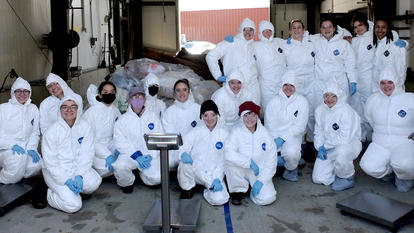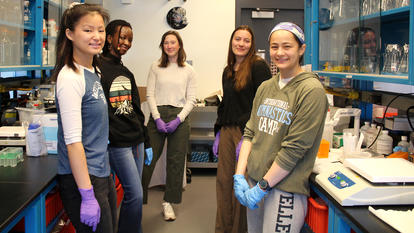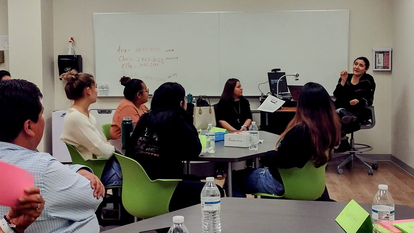Wellesley Honors Three Professors for Excellence in Teaching

Each year the Anna and Samuel Pinanski Teaching Prize honors members of the faculty who have demonstrated excellence as teachers. “Throughout the year, in my conversations with our students and alumnae, there is one constant: their eagerness to tell me their story of how a Wellesley professor changed their life and helped them achieve breakthroughs, both academic and personal,” said President Paula Johnson in announcing this year’s recipients at commencement on May 31.
The finalists are selected by a student-faculty committee on the basis of nominations from students, faculty, and staff. During commencement exercises, the president reads a citation for each of the winners. Below are excerpts from these citations.
Kimberly Cassibry, associate professor of art
For Professor Cassibry, the past is never dead, or even past. She brings antiquities to life, exploring how the art and architecture of the ancient Mediterranean and Mesopotamia can illuminate and inform our understanding of international relations and the experience of empire.
Professor Cassibry’s classroom is a place for students to see antiquities through many lenses, not just as material artifacts that have survived time, but as cultural objects imbued with meanings and narratives that continue to shape national identities and international policies.
“She held every one of us accountable for mastering the material and the ideology that was being shaped by the art itself,” says one student. “We were encouraged to see both the ancient and modern connections for every piece of art we examined.”
Professor Cassibry’s research challenges ancient and modern ethnic stereotypes, and as a teacher, she is committed to cultivating a diverse, equitable learning environment. “She encourages us to acknowledge our own identities, and how our unique perspectives can contribute to the field in ways that we have never considered,” one student says. “Professor Cassibry has dedicated herself to opening up the field to diverse ideas.”
Professor Cassibry centers student voices and prioritizes discussion in her classes. As many of her students attest, in her teaching Professor Cassibry is precise, thorough, and captivating. “Professor Cassibry’s Pompeii class is the light of my semester,” says a student who elected art history as her major because of her. “The fact that someone would declare an entire major just to take advantage of a singular professor is indicative of that professor’s deep vitality to the College.”
For the care, inspiration, and compassion she demonstrates in the classroom, for enlivening the past as well as the present, and for helping every student feel supported, empowered, and engaged, it is an honor to present Kimberly Cassibry with the Anna and Samuel Pinanski Teaching Prize.
Soo Hong, associate professor of education
Professor Hong turns talk about equity, justice, and inclusive excellence into action on a daily basis. Her pedagogy and co-curricular programming exemplify her commitment to teaching and learning in ways that respond to students’ diverse experiences, and that better equip students to respond to the specific needs of the communities in which many will work.
As one student explains, “She takes the traditional classroom space—a space that has historically excluded marginalized experiences—and puts into practice the more inclusive type of pedagogy that she teaches about in her courses, that of culturally sustaining pedagogy.”
Professor Hong encourages and inspires her students through rigorous, innovative assignments and pushes them to consider what theories on school reform look like in practice. She has asked students to create multimedia projects featuring interviews about the educational experiences of their family and community members, brought her class to meet the students who helped organize the Boston Public School walkouts over education funding cuts, and encouraged students to attend conferences on education for social justice.
Professor Hong is unceasingly inviting and inclusive with her students and colleagues. As one student remarks, “There is always tea or coffee brewing in her office.” An avid NBA fan, she has invited whole classes to her home to watch Celtics games, and also hosts brunches and dinners to celebrate student teaching achievements and graduate school acceptances. As one student puts it, “she is an advisor, a mentor, a professor, a role model, and a friend.”
For her commitment to teaching in ways that respond to students’ diverse experiences, and her efforts to make connections between the classroom and the community, it is an honor to present Soo Hong with the Anna and Samuel Pinanski Teaching Prize.
Jaclyn Hatala Matthes, assistant professor of biological sciences
Whether in the classroom or in the lab, Professor Matthes is dedicated to making biology exciting and accessible to all students, regardless of major or previous exposure to the field.
Professor Matthes’ teaching fosters students’ appreciation for the intricacy of ecosystem ecology, highlighting the complex coupling between the earth’s organisms and their physical environment. Whether she is teaching introductory organismal biology, advanced ecosystem ecology, or biological modeling, she is involved and thoughtful, clear and direct. “She is the embodiment of the highest standard of instruction,” one student says. “Her labs are a transformative experience,” says another.
Professor Matthes is deeply committed to highlighting professionalization opportunities for her students, and to encouraging them in their research and publication efforts. She helps students hone their elevator pitches for their projects, hosts question and answer sessions on the research publication process, connects her students with her graduate advisees, hosts research modeling crash course sessions, and coaches students as they write their resumes. She also finds time to host cookie decorating parties and brunch in her home. As one student explains, “Professor Matthes isn’t just a principal investigator. She is a mentor. She makes it known that she is always available to talk about biology, ecology, Wellesley, or anything else on our minds.”
For encouraging women to envision successful futures in science, the kindness and consideration with which she approaches her students, and her commitment to their intellectual and professional development, it is an honor to present Jaclyn Hatala Matthes with the Anna and Samuel Pinanski Teaching Prize.



